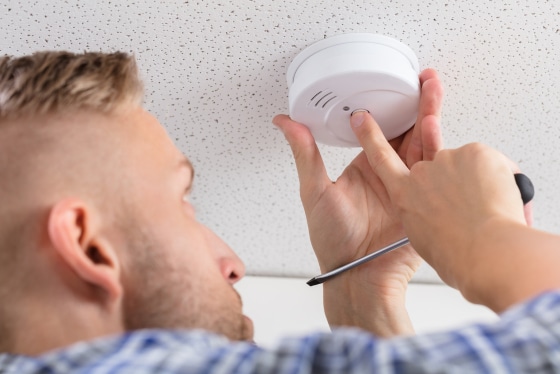New legislation has come into force in February 2022. It requires every home in Scotland not only to have smoke alarms but to have interlinked smoke alarms. Whilst this legislation was created in 2019, it is only now coming into effect.
Why was this legislation introduced?
The legislation was brought forward in 2019 following the Genfell Tower fire. However, it’s implementation was delayed as a result of the coronavirus pandemic. The legislation aims to ensure that every home in Scotland is protected by interlinked smoke alarms.
Where to interlinked smoke alarms need to be installed?
These alarms need to be installed in every home in Scotland. That means the legislation applies to all homeowners as well as private landlords. Make sure your landlord has fitted interlinked smoke alarms if you are living in private rented accommodation.
Are there any special types of alarms required?
The legislation requires every home to have interlinked smoke alarms. In addition, you will need a heat alarm in the kitchen. You will also need a carbon monoxide detector in any room where a carbon fuelled appliance is located.
Where do these alarms need to be located?
Different types of interlinked alarms need to be fitted to different locations:
- The room most frequently used for living purposes during the day needs to be fitted with a smoke alarm;
- Every circulation space in the house needs to have an alarm. This means you need to fit a smoke alarm in the hall. If your house has two (or more) storeys, you need a smoke alarm on each floor or landing;
- A heat alarm for each kitchen;
- A carbon monoxide detector where there is any carbon fuelled appliance. This means the rooms where your boiler and any open fires or heaters are located.
I already have smoke alarms – do I need to change these?
You will need to change these unless they are (1) interlinked alarms and (2) meet a certain standard. The first reason for this is that “stand alone” smoke alarms will only sound in the room where they are triggered. Interlinked alarms all sound together irrespective of where the fire is located. This means if you are in the kitchen and there is a fire in the living room, all of the alarms, including the alarm in the kitchen will sound.
The new alarms must comply with certain standards. They can be either mains powered or battery powered. we recommend using a qualified installer if you intend to fit mains powered alarms. You can fit battery powered alarms yourself. The units must be sealed battery units. These usually have a 10 year lifespan.
The standards required are:
- Heat alarms – BS 5446-2:2003
- Smoke alarms – BS EN14604:2005
- Carbon monoxide detector: British Kitemark EN50291-1
Please make sure any alarms you purchase meet these standards.
In addition, we should also point out that the carbon monoxide detector does not need to be linked to any other alarms.
Is it a criminal offence not to have interlinked alarms?
No. It is not a criminal offence if you do not fit these types of alarms. Local authorities are responsible for enforcement of the legislation. However, they will not enter people’s homes to carry out an inspection nor will they issue fines.
Why should I bother if there are no strong sanctions?
You may be affected ff you are selling your house. The Home Report will highlight the lack of interlinked smoke alarms. It will be indicated as an essential repair. This may influence potential buyers.
Home insurers have indicated that you will not lose cover if you do not fit interlinked alarms. However, you should check your renewal notice in case the terms have changed requiring you to fit these types of alarms.
Are they expensive and is there any financial assistance to install them?
It should cost around £220 to purchase these alarms. However, the size of your house will drive the number of alarms required. That means the greater the number of alarms, the greater the cost.
You can access financial assistance through Care and Repair Scotland. Assistance is available to disabled and older people. Care and Repair Scotland has recently been given an additional £500,000 to help vulnerable older and disabled people with their interlinked smoke alarm installation.
As always, there are conditions relating to eligibility.
- You must live in a house that is in a Council Tax Banding of between A and C;
- You must also either be of state pension age or be receiving guaranteed Pension Credit; or
- Have a disability and be in a support group for Employment and Support Allowance.
You should contact your landlord if you are a tenant. Your landlord is responsible for installing your interlinked smoke alarms.
Where do I find more information?
Click here to find more information on the Scottish Government website.


